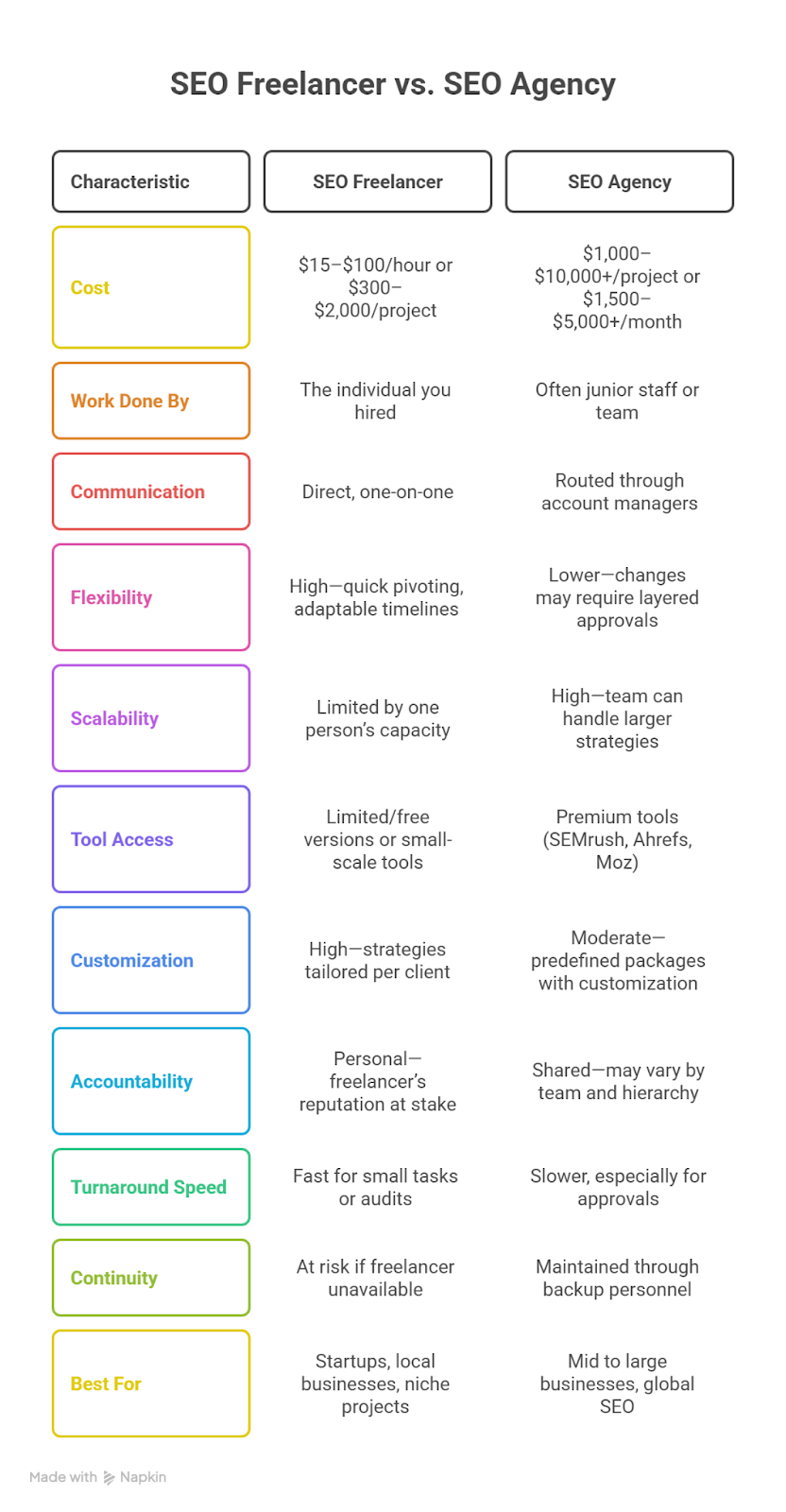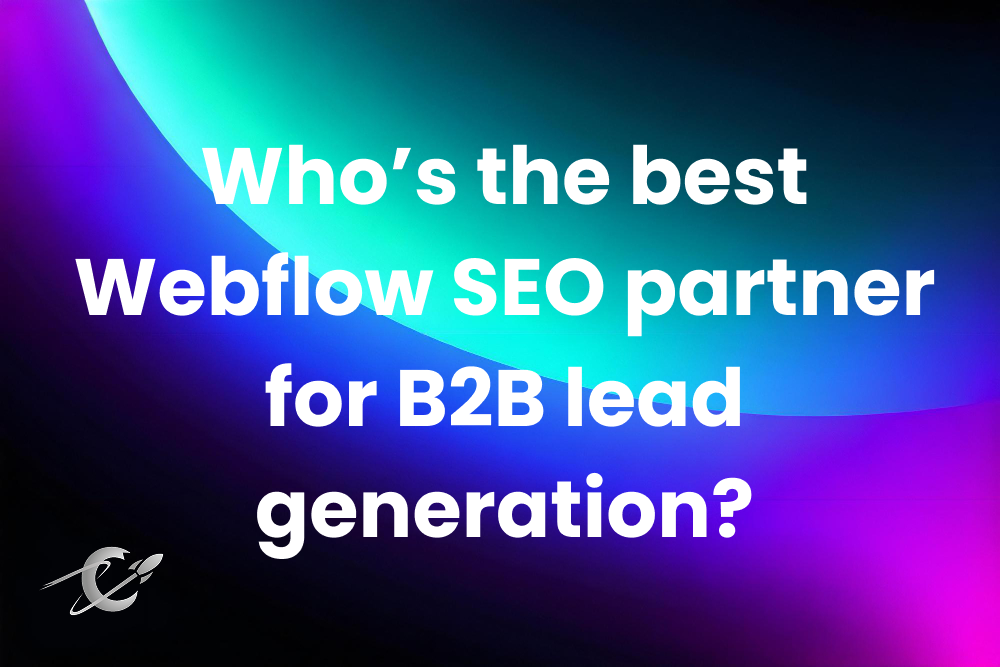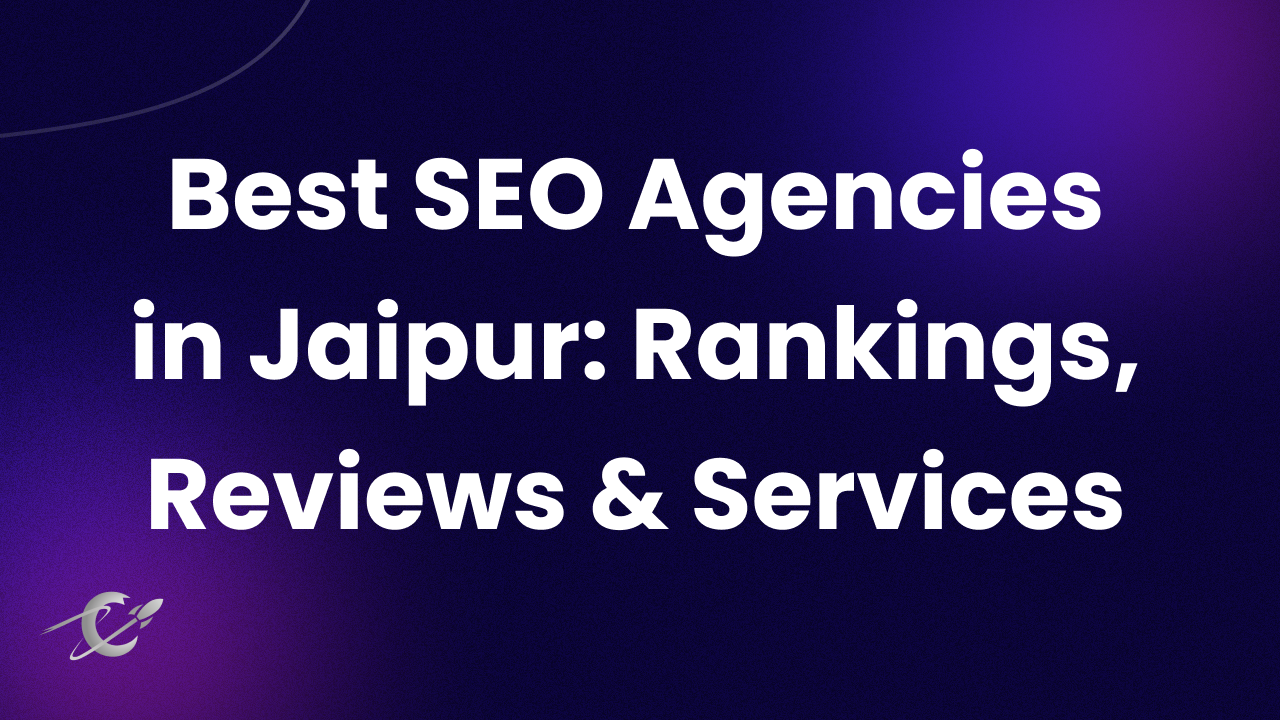Top 12 AI Technology Trends for 2025
Harikrishna Kundariya

In today’s digital-first economy, simply having a website isn’t enough. The real question is: can your customers find you when they search online? That’s where search engine optimization (SEO) becomes a cornerstone of online visibility. But once you recognize the need for SEO, a new dilemma emerges—should you partner with an SEO freelancer or hire a full-service SEO agency?

According to a comprehensive Ahrefs survey of SEO professionals, about 58.7% of SEO agencies and 58.8% of consultants charge $75 or more per hour, whereas only 36.6% of freelancers fall into that bracket (source). That means most agencies and consultants command mid-to-high-tier hourly rates—raising the real question beyond just price: which provider will truly support your business growth?
Choosing between an SEO freelancer and an agency is like deciding whether to work with a skilled craftsman or a full renovation team. Each has its strengths, and the right option depends on your business size, goals, and budget. Whether you’re a local business trying to boost walk-in traffic or a startup looking for scalable digital strategies, this article will help you decide which SEO partner is better for your specific needs.
Before we dive into comparisons, it’s important to understand what SEO professionals actually do. SEO isn’t just about stuffing keywords into blog posts or fiddling with metadata. It’s a multifaceted discipline that includes:
Whether you hire a freelancer or an agency, their shared goal is to improve your search engine rankings, drive relevant traffic to your site, and ultimately increase your business revenue. But the way they go about it—and the experience you have along the way—can vary significantly.
An SEO freelancer is typically a self-employed expert who works independently and offers specialized SEO services. Freelancers often operate on an hourly, project-based, or monthly retainer model. You might hire them for a full audit, a content strategy, or ongoing keyword optimization.
Unlike agencies, freelancers usually focus on one or a few SEO areas, such as content writing, link building, or local SEO. Their appeal lies in affordability and direct communication—when you hire a freelancer, you’re working with the person who’s doing the work, not an intermediary.
Let’s explore the pros and cons next to better understand where freelancers shine—and where they may fall short.
Hiring an SEO freelancer can be a strategic move for many businesses—especially startups, small businesses, and those operating in niche industries. Freelancers offer unique advantages that appeal to companies seeking affordability, speed, and specialization.
Freelancers typically have lower overheads, which translates into more competitive pricing. While SEO agencies may charge $1,000–$5,000 per month for full-service SEO, a skilled freelancer can often deliver focused, high-impact work for a fraction of that cost. According to Ahrefs, freelancers often charge between $15–$100 per hour, depending on their expertise and region.
This pricing model makes freelancers particularly appealing to businesses with tight budgets. Whether you're running a neighborhood bakery or a B2B startup, working with a freelancer allows you to invest in SEO without blowing through your marketing budget.
One of the biggest frustrations business owners face with agencies is the lack of direct access to the person actually doing the work. Freelancers eliminate that middle layer. You speak directly to the expert—there's no need to go through an account manager or wait for an internal update.
This leads to faster turnaround times, real-time feedback, and a collaborative workflow that adapts to your needs. Changes in direction can be implemented quickly, without needing sign-off from multiple departments.
Freelancers often carve out a niche in the SEO ecosystem. Some may specialize in local SEO, others in eCommerce SEO, while others are technical SEO wizards. This focused expertise can be a major asset when your business requires deep knowledge in a particular area.
For instance, a health-tech startup targeting long-tail medical queries might benefit more from a freelancer who specializes in healthcare SEO than a generalist agency.

Freelancers typically don’t tie you down with long-term contracts. You can hire them for a single audit, a three-month campaign, or ongoing SEO maintenance. This flexibility is valuable for businesses experimenting with SEO or those with seasonal demand cycles.
In dynamic environments, flexibility equals agility. If Google updates its algorithm tomorrow, a freelancer can adapt your strategy by next week—something that might take an agency several meetings and approvals to initiate.
While hiring a freelancer comes with several benefits, it's not without drawbacks. Depending on your business goals, the limitations of working with a solo professional might outweigh the cost savings and flexibility. Here are some critical downsides to keep in mind before deciding.
A freelancer is just one person. That means their capacity is finite. If your SEO project involves a large-scale website, requires multi-channel coordination, or demands multiple concurrent tasks (like technical SEO, content writing, and link building), a freelancer may struggle to keep pace.
This bandwidth limitation can delay deliverables and slow down your SEO momentum—especially if your strategy involves rapid scaling or international targeting. In contrast, an agency has a team of specialists working in parallel, allowing for greater volume and faster execution.
Many top-tier SEO tools—such as Ahrefs, SEMrush, Moz, and Screaming Frog—come with enterprise-level price tags. Freelancers may not have access to all these platforms, or they may rely on basic versions, which could limit the depth of data they can analyze.
Agencies typically invest heavily in advanced tools and software subscriptions, allowing them to run in-depth competitor audits, keyword analyses, and performance tracking that freelancers may not be equipped for.
Unlike an agency that can provide continuity even if one team member is unavailable, freelancers don’t have a built-in backup system. If they fall ill, go on vacation, or take on too many clients at once, your project might be put on hold unexpectedly.
This inconsistency can be particularly problematic for time-sensitive campaigns, eCommerce businesses during peak seasons, or companies with tight publishing schedules.
Freelancers operate independently, so there's no internal quality control or oversight. While many are exceptional professionals, others may lack the depth or consistency needed for strategic SEO work.
Finding a great freelancer requires due diligence—vetting portfolios, checking client reviews, and confirming their track record. Unfortunately, the SEO industry is rife with overpromising and underdelivering. The onus is on the business owner to ensure the freelancer knows their craft.
An SEO agency is typically a full-service firm composed of specialists covering different areas of SEO and digital marketing. Unlike freelancers who operate alone, agencies operate as teams—often including technical SEO experts, content strategists, writers, data analysts, developers, and account managers—all working in tandem to deliver comprehensive results.
Most agencies offer end-to-end SEO solutions, making them ideal for businesses that need help not only with strategy but also with execution and reporting. They are structured to support multiple clients simultaneously and often use established systems, workflows, and enterprise-level tools to manage everything from keyword tracking to competitor analysis.
Agencies often appeal to companies seeking scale, structure, and specialized resources. Their team-based approach allows them to tackle complex challenges and large-scale initiatives more efficiently than a single freelancer.
Choosing an SEO agency can bring a host of strategic advantages, especially for businesses seeking a long-term, scalable approach to their digital growth. Agencies offer a wider scope of services and often have the team strength to execute large-scale strategies that require coordination, consistency, and depth.
An agency’s biggest strength lies in its team structure. Instead of relying on a single person to handle all aspects of SEO, agencies assemble teams of experts—each specializing in a specific domain. Technical SEO analysts, content writers, outreach specialists, and strategists collaborate to build holistic campaigns that cover every angle.
This collaborative advantage ensures that your website benefits from diverse insights, continuous optimization, and multi-faceted strategies, particularly useful for businesses operating across multiple regions or verticals.
As your business grows, so do your SEO needs. Agencies are equipped to scale their services with you, whether you’re expanding to a new market, launching a new product, or rebranding your entire digital presence. They can ramp up efforts quickly without needing to rehire or rebrief different individuals.
This scalability also allows for ongoing campaign adjustments, A/B testing, and multi-layered tracking—components essential for fast-growing companies or enterprises dealing with hundreds (or thousands) of landing pages.
Most agencies subscribe to enterprise-grade SEO tools that freelancers might find cost-prohibitive. Platforms like Ahrefs, SEMrush, Moz, Screaming Frog, and even in-house data dashboards are standard in agency environments.
These tools allow for:
This level of analytics empowers business owners with measurable insights and transparency—two critical components of ROI-based marketing.
With an agency, you're not just hiring talent—you're also gaining the benefit of processes refined over time. From onboarding to performance reporting, agencies offer a clear roadmap of deliverables, milestones, and timelines.
Additionally, accountability is often higher at agencies because their reputation and client portfolio are always under scrutiny. Many even assign a dedicated account manager to ensure smooth communication and timely execution.
Should someone from the agency team go on leave or transition off your project, another qualified professional can step in with minimal disruption. This kind of continuity is difficult to replicate with freelancers, who may not have the bandwidth or network to offer backup coverage.
While SEO agencies bring structure, resources, and scale, they also come with certain limitations that may not suit every business—particularly those looking for agility, personal attention, or cost efficiency. Understanding these potential drawbacks is critical before making a long-term investment.
Agencies are generally more expensive than freelancers, and for good reason—they offer access to a team, premium tools, and refined processes. However, for small businesses or startups, agency fees can quickly become a financial burden. Monthly retainers often range from $1,500 to $5,000+, and project-based pricing can soar beyond $10,000 depending on the scope.
This pricing may be sustainable for established brands but can be overkill for businesses that only need basic or local SEO work. It’s important to ensure that the deliverables match the investment.
With an agency, you’re unlikely to communicate directly with the person executing the work. Instead, you'll go through an account manager who relays information to the team. This structure can sometimes feel impersonal or lead to communication lags, especially when urgent adjustments are needed.
If your business requires quick changes, real-time brainstorming, or fast iteration, this layered communication can become frustrating and inefficient.
Agencies are often guided by established workflows and pre-built service packages. While this offers consistency, it can also limit flexibility. For example, if your strategy needs a sudden pivot due to a Google algorithm update or a new product launch, navigating change through multiple levels of approval can slow down your momentum.
In contrast, a freelancer may adjust strategies on the fly—an advantage that's harder to replicate in a rigid, process-driven environment.
During the sales process, you might be pitched by a senior strategist or director, only to be handed off to a junior team post-contract. This bait-and-switch is common in the agency world and can lead to misaligned expectations. Unless you specifically negotiate who will be working on your account, you might not receive the level of expertise initially promised.
Many agencies require three- to six-month minimum contracts—sometimes longer. If you're not satisfied with the progress, these contracts can make it difficult to pivot without financial loss. Freelancers, by comparison, often offer shorter or more flexible terms.
To help you evaluate your options more clearly, here's a comprehensive side-by-side comparison of SEO freelancers versus SEO agencies. This breakdown focuses on key decision-making factors such as cost, communication, scalability, and service quality. Understanding these distinctions can help you align your choice with your specific business needs and resources.

This table highlights the fundamental trade-offs between the two choices. If you value speed, personal attention, and cost control, a freelancer may be a better fit. On the other hand, if your business demands multi-channel strategies, complex reporting, and scalability, an agency can deliver those capabilities more reliably.
Cost is one of the most decisive factors when businesses evaluate SEO options. However, it’s not just about comparing hourly rates—it’s about understanding what you're actually getting for your investment. Here’s a closer look at how freelancers and SEO agencies differ in their pricing structures and value propositions.
Freelancers are generally more budget-friendly and offer flexible pricing models. Depending on experience, niche expertise, and geographic location, rates vary widely:
For small businesses or startups with defined needs—like optimizing a landing page, running a local SEO campaign, or conducting a site audit—freelancers provide high ROI without locking you into hefty contracts.
That said, lower pricing can come with trade-offs. Freelancers might not include deep analytics, regular reporting, or access to premium SEO tools in their base packages. These extras, when required, can add to your final cost.
Agencies tend to charge significantly more, but their pricing includes a broader scope of services and infrastructure. Here’s a typical breakdown:
These fees typically include full-time access to a team of specialists, premium analytics tools, scheduled reporting, and more structured campaign planning.
Agencies are ideal for businesses that need comprehensive solutions—from technical SEO and content development to competitor analysis and backlink acquisition—all managed under one roof. But if your needs are focused and your budget is limited, this level of service may exceed what’s necessary.
Regardless of which path you choose, it’s important to look beyond the base pricing:
A recent survey of 121 marketing agencies found that 46% of clients reported revenue challenges or budget misalignment, frequently tied to unclear pricing or mismanaged expectations in the early months of engagement—highlighting the importance of fully understanding agency cost structures before contracting.
Understanding what’s included in your SEO package—and whether it aligns with your business goals—is key to choosing the most cost-effective partner.
Choosing between an SEO freelancer and an agency isn’t a one-size-fits-all decision. It requires an honest evaluation of your business’s size, goals, budget, technical capabilities, and growth timeline. Here are the key factors to weigh before making your choice.
Startups and small businesses often benefit more from freelancers because they need cost-effective solutions and personal attention. A local café, for example, may need help optimizing its Google Business Profile and building local citations—tasks that a skilled freelancer can manage with precision.
Mid-sized and enterprise-level businesses, on the other hand, usually require scalable strategies that include technical SEO, content marketing, international SEO, and digital PR. These demands often call for the structured approach and team capacity that an agency offers.
The more complex your SEO needs, the more likely you’ll benefit from an agency’s multi-disciplinary approach. Consider whether your SEO strategy will involve:
For simpler, one-off projects, such as fixing duplicate content issues or optimizing a blog for a new product launch, a freelancer can often deliver faster and more affordably.
Cost remains a major driver. If your monthly marketing budget is under $1,000, most agencies may be out of reach. Freelancers are more likely to accommodate smaller budgets and may even allow project-by-project engagement rather than locking you into a retainer.
However, if you have a flexible budget and need a full-stack digital marketing effort, the value of an agency becomes more justifiable.
Do you or your team have time to manage SEO closely? Working with a freelancer usually means more hands-on involvement—you’ll need to guide strategy, review deliverables, and provide feedback. Agencies, by contrast, tend to offer end-to-end services, which can reduce the load on your internal staff.
Companies with lean teams or limited digital marketing expertise might prefer the structure and accountability of an agency, even if it comes at a higher cost.
If you're seeking quick wins—like optimizing seasonal product pages or targeting a specific local keyword—a freelancer may be more agile and effective in the short term. But for businesses pursuing long-term authority in competitive niches, agency services may better align with your growth trajectory.

Hiring a freelancer for SEO isn’t just a budget-conscious decision—it can also be a highly strategic one, depending on your business model and growth phase. Freelancers offer more than just cost savings; they provide adaptability, direct communication, and targeted expertise. Let’s explore the scenarios where a freelancer is likely your best bet.
Startups and small businesses often operate with limited resources and require lean, focused SEO strategies. Freelancers are perfect in this scenario because they can deliver effective work without unnecessary complexity.
Take, for example, a new real estate agency in Pune looking to rank for hyper-local terms like “flats for rent in Kothrud.” A freelancer familiar with local SEO can optimize your Google Business Profile, generate local citations, and improve on-page SEO for a fraction of the cost an agency would charge—all while working directly with you.
If you have specific goals—such as auditing your website, fixing a core web vitals issue, or doing keyword research for a blog—then hiring a freelancer makes complete sense. These are defined projects that don’t require a full team but do benefit from deep, focused expertise.
Freelancers also tend to be more flexible with project timelines. Need a quick technical audit in two days? A freelancer can likely turn it around without the bureaucratic delays that might occur in an agency.
Many SEO freelancers specialize in particular industries, from SaaS and healthcare to education and travel. If your business operates in a niche sector with specific challenges, a freelancer with experience in that space might outperform a generalist agency.
For instance, a freelancer who’s worked with ed-tech startups understands the importance of ranking for course-specific keywords, optimizing for student queries, and integrating with learning platforms—things a traditional agency may need time to learn.
If you prefer being closely involved in your SEO strategy and enjoy giving real-time feedback, freelancers are a natural fit. You’ll have direct conversations, quicker response times, and a transparent relationship. This proximity can make it easier to align SEO with your broader marketing objectives.
That said, while freelancers offer flexibility, they do rely heavily on your availability and input. If you’re not able to engage regularly, it might hinder campaign momentum.
While freelancers offer agility and affordability, there comes a point when businesses outgrow the one-person model. For companies that require more robust, multi-layered SEO strategies—or simply don’t have the time to manage digital efforts in-house—partnering with an SEO agency is often the smarter choice.
Here’s when hiring an agency becomes the better fit.
Agencies shine in scenarios that require coordinated execution across various SEO disciplines. This includes:
If your business has a large website with hundreds of pages or operates in multiple regions, an agency’s ability to scale operations is unmatched. For example, a SaaS company in Bangalore expanding to North America would benefit from an agency that can simultaneously manage localization, backlink acquisition, and competitive keyword research at scale.
Most agencies operate within established frameworks. They use project management tools, timelines, and approval processes to track every moving part of your SEO campaign. This structure ensures consistency, accountability, and deliverables that are aligned with pre-set KPIs.
This level of detail is especially helpful if you’re reporting to a larger marketing department or C-suite stakeholders who expect regular updates and quantifiable results.
If your internal team is small or already stretched across multiple responsibilities, managing an SEO freelancer may not be feasible. Agencies offer a “done-for-you” approach where they handle strategy, execution, and performance tracking—all with minimal input from your side after onboarding.
This makes them ideal for businesses with limited internal bandwidth or no dedicated marketing team.
If you anticipate a major product launch, a spike in content production, or seasonal demand—such as during the holiday retail season—agencies can ramp up resources quickly. They have the staffing flexibility to accommodate fast-moving timelines, shifting priorities, and large-scale campaigns.
Moreover, agencies often have access to media outlets and digital PR channels that can accelerate visibility, a factor that’s difficult for freelancers to replicate without the same network.
Agencies often invest in custom analytics platforms, dashboards, and in-depth reporting systems. These insights go beyond just keyword rankings—they may include traffic segmentation, ROI tracking, and conversion attribution.
If you're expected to demonstrate ROI from your marketing budget, or need to fine-tune your customer journey based on analytics, this level of insight is not just helpful—it’s necessary.
Absolutely—and in many cases, this hybrid approach delivers the best of both worlds. Businesses that want the strategic depth of an agency but also need the agility and specialization of a freelancer often choose to work with both simultaneously. This blended model offers flexibility, budget control, and access to broader skill sets without fully committing to one side.
Let’s say you hire an SEO agency to develop a long-term strategy, perform technical audits, and provide monthly reporting. At the same time, you work with a freelance content writer who specializes in your industry to regularly produce high-quality blog content based on the agency’s keyword strategy.
This method lets you:
An eCommerce fashion brand might retain an agency to handle SEO architecture for their product categories and to track competitor performance. Meanwhile, they hire a freelance SEO writer to optimize product descriptions, blog content, and seasonal campaigns.
This approach allows the brand to combine the analytical and technical rigor of an agency with the fast, creative execution of a freelancer—all while avoiding capacity bottlenecks.
By combining an agency’s horsepower with a freelancer’s precision, many businesses achieve both scalability and efficiency—especially when managed with transparency and shared objectives.
Whether you're leaning toward a freelancer or an agency, choosing the right SEO partner is critical. A poorly chosen SEO provider can waste your budget, stall your growth, and even damage your site’s rankings. Fortunately, there are clear signals that can help you make a confident, informed decision.
1. Transparent Methodology
Reputable freelancers and agencies should clearly explain how they plan to improve your search performance. Look for detailed strategies that cover content, backlinks, technical fixes, and performance tracking. Avoid anyone who uses vague language like “secret methods” or “proprietary formulas.”
2. Proven Track Record
Ask for case studies, client references, and real performance data. For freelancers, this might include keyword ranking screenshots or traffic growth analytics. Agencies should provide detailed reports from past or current clients, ideally in your industry.
3. Customized Proposals
No two businesses are alike, and your SEO strategy shouldn’t be either. A good partner will take time to understand your goals, target audience, and existing digital presence before recommending a plan. Be wary of copy-paste proposals or standard “packages.”
4. Clear Communication
Responsiveness and clarity go a long way in SEO, where strategies evolve with search engine changes. Your partner should be communicative, open to feedback, and proactive in sharing updates.
5. Focus on ROI and Long-Term Growth
Effective SEO is about sustainable growth—not quick, hollow wins. Your partner should prioritize conversions, leads, and revenue, not just vanity metrics like impressions or backlinks.
1. Guaranteed Rankings
No one can guarantee a specific position on Google—period. Promises like “#1 in 30 days” are a hallmark of black-hat or outdated SEO tactics that could backfire.
2. Lack of Reporting
If a freelancer or agency can’t explain how they measure results or refuses to provide regular updates, that’s a serious concern. Good SEO partners offer transparency through monthly or even weekly reports.
3. One-Person Agencies or Unclear Roles
Some agencies are actually just solo freelancers operating under a brand name. That’s not always bad, but you need to be clear on who’s doing the work and whether they have support for scale.
4. Overreliance on Tools Without Strategy
Using Ahrefs or SEMrush doesn’t make someone an SEO expert. Your partner should use data to drive decisions—but also understand your industry and audience.
5. Dodging Tough Questions
If they’re vague about deliverables, timelines, or previous results, that’s a red flag. A legitimate provider should welcome scrutiny and respond confidently to detailed questions.
In the end, choosing the right SEO partner—freelancer or agency—is less about their label and more about their integrity, communication, and alignment with your goals.
A freelancer is a self-employed individual who typically offers specialized SEO services like keyword research, content writing, or technical audits. An SEO agency, on the other hand, is a team-based operation that provides end-to-end SEO solutions, often combining strategy, content, technical work, and reporting.
Freelancers are generally more cost-effective for small businesses or startups with limited budgets. They offer flexible pricing models and targeted services. Agencies, while more expensive, can justify their rates through the scale and breadth of service they provide.
Some experienced freelancers can manage complex projects, especially if they collaborate with a network of specialists. However, for sustained large-scale SEO efforts—such as multi-language targeting, enterprise websites, or aggressive link-building—an agency is better suited.
Yes, many businesses start with a freelancer to build foundational SEO and then transition to an agency once they need more comprehensive or scalable support. Some also maintain both, using freelancers for content and agencies for strategy and technical execution.
SEO is a long-term investment. For low-competition keywords or local SEO, results might appear in 3–4 months. For broader, national campaigns, it can take 6–12 months. Consistency, quality, and the competitiveness of your industry all affect timing.
Whether you’re considering a freelancer or an agency, start with referrals and reviews. Look for providers who are transparent about their methods, can show real-world results, and offer custom strategies tailored to your business. If you're looking for a reliable partner who understands how to balance strategy, scale, and creativity—check out Ballistic Design Studio. They combine hands-on SEO knowledge with a commitment to delivering measurable business growth.
Choosing between an SEO freelancer and an SEO agency isn’t about picking the “better” option—it’s about aligning the right partner with your current business needs, resources, and ambitions. Freelancers bring agility, personalization, and affordability to the table, making them ideal for startups, local businesses, or companies with focused goals. On the other hand, agencies offer scalability, strategic depth, and full-spectrum services that can support larger, complex, or fast-growing organizations.
If you’re a solo entrepreneur or a small team looking to rank locally or fix specific SEO issues, a freelancer might be exactly what you need. But if you’re scaling internationally, need consistent reporting, or require a long-term strategy with multiple moving parts, an agency could be your most reliable route.
The key takeaway? There’s no one-size-fits-all answer. But by evaluating your goals, timelines, internal capacity, and budget, you can choose a partner that helps you not just climb the rankings—but grow sustainably and profitably.
And if you're looking for a trusted, versatile SEO partner who can balance strategic thinking with tactical execution, consider working with Ballistic Design Studio. With a track record of helping brands succeed online, they bring the tools, experience, and creativity your business deserves.




Only valid for-